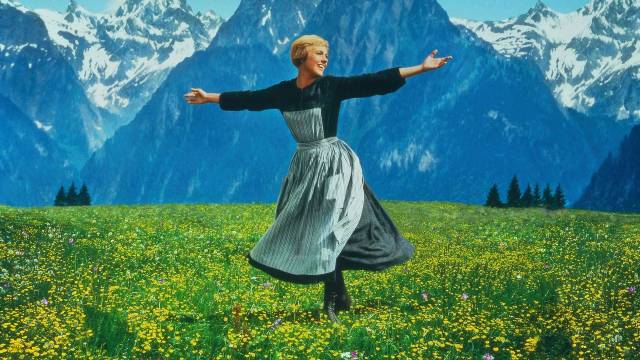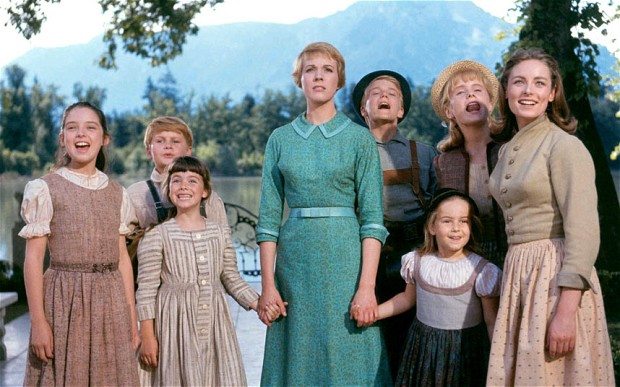
 Tom Santopietro’s The Sound of Music Story might very well be the definitive book on the making of the beloved motion picture musical. From its real life origins, to its Broadway incarnation, and finally the Oscar-winning film starring Julie Andrews and Christopher Plummer, the book chronicles every single element that came together to create this classic. Mr. Santopietro’s writing is clear, informative and very entertaining, which makes the book an ideal companion for lovers of the film, or anything to do with classic Hollywood for that matter.
Tom Santopietro’s The Sound of Music Story might very well be the definitive book on the making of the beloved motion picture musical. From its real life origins, to its Broadway incarnation, and finally the Oscar-winning film starring Julie Andrews and Christopher Plummer, the book chronicles every single element that came together to create this classic. Mr. Santopietro’s writing is clear, informative and very entertaining, which makes the book an ideal companion for lovers of the film, or anything to do with classic Hollywood for that matter.
With The Sound of Music celebrating its 50th anniversary in 2015, Mr. Santopietro has joined the celebrations and has been discussing the film, as well as his terrific book, in screenings all over the country. On May 2, the film will be presented in 70MM at The Museum of the Moving Image and Mr. Santopietro will be there to discuss the film and interview Marni Nixon. We talked to Mr. Santopietro about the book and his passion for the von Trapp story.
The Sound of Music was the very first show you saw on Broadway, in the pre-internet days were you invested in the casting news about the film in the way modern fans are?
That’s an interesting question, I was so young when I saw the show, I was probably 5 years old when I saw the Broadway show and I joke by saying I wish I’d had some intellectual response to it, but the only thing I remembered about the production was that Rolfe delivered a telegram to the von Trapps and that he rode his bicycle onstage, I thought that was the coolest thing I’d seen in my entire life! He didn’t even have training wheels! I was ten when the movie came out, but I’d seen Mary Poppins and remember I completely fell in love with Julie Andrews after The Sound of Music but really the whole world did.
Are you more partial to the soundtrack than to the Broadway recording?
Yeah, of course I listened to everything when I was writing the book, but the one I listen to the most is the soundtrack from the film. It’s very interesting to see which songs were dropped from the Broadway production, also the two new songs Richard Rodgers wrote, which is always fun for us musical lovers.

In the days of home media the film has lent itself to multiple ways of being watched. For example I always stop it after the wedding, I don’t like the scenes with the Nazis, and I know other people who just skip from musical number to musical number. Would you call us heathens or would you say this malleability is what’s made the film a classic?
(Laughs) One of the reasons I wanted to write the book is that I love the movie, but I’m also fascinated by these movies that people are obsessed with and have to see over and over again. My previous book was about The Godfather films and it’s the same, people are obsessed with those films, they have to see them 10, 30 times...The Sound of Music has many reasons for its success, for example it has more hits than any other musical ever, it has a star in the role she was born to play, and it’s about family, which is a universal emotion, family as a sanctuary. People are so caught up in this that they keep coming back to it over and over, it’s like they want to dive into the screen and be a part of that world. Today I feel like that’s a huge reason behind the overwhelming success of Downton Abbey people watch that on TV and they want to be part of that world.
Did you find any other parallels between The Godfather and The Sound of Music?
Both of them revolutionized movie going too, The Sound of Music was so popular as a roadshow attraction that went on for five years and The Godfather brought the concept of wide release. They changed part of the rules of films but I joke that there are other parallels, including the fact that they were directed by two of the greatest filmmakers ever, they were edited by the same man too, a genius named William Reynolds. There’s also the concept of family which is much more obvious in the first Godfather...my joke is that one of these families solves their problems by singing show tunes and the other solves them by using machine guns. The concept of loving your family is the same.
Robert Wise climbed up the studio ladder and did almost every job in a movie before becoming a director, do you think in a way he saw himself as Captain von Trapp who also must’ve had to climb up the military ladder to reach his rank?
That’s an interesting point, the Captain was the head of the household and there was no question, and Robert Wise was the captain of this ship too. The great thing about Robert Wise is that there was not a single job on a film shoot that he couldn’t do. He started out as a sound editor, he edited Citizen Kane and he could do anything!
It’s sad that his versatility wasn’t appreciated by auteurists…
The auteurs dismissed him for lack of a singular style and I think that’s so wrong, to me it’s the weakness of that theory. I always want to say who wrote the script, because there would be nothing for a director to put his stylistic signature on without a screenplay, so this is an argument that rages. Doing my research I read an interview with Sidney Lumet who really went to town on the auteur theory and said they were just responding to stylists, Robert Wise was much less combative than Lumet and he was also too much of a gentleman to get into arguments, so he let the work speak for itself.
I have to confess that my mind went down into the rabbit hole when you compared the real life Maria von Trapp to Katharine Hepburn. And as I read about all the actors who’d been considered to play the roles I imagined an entire new cast for the film! What fantasy casting remains your favorite?
Because I’m such a huge fan of hers I would’ve been really interested to see Doris Day play the role, because when it was filmed she was the single biggest movie star in the world, and she was a terrific singer and actress. She said that she was too all-American for anyone to believe she was a nun from Austria, while that’s true, she was just so great that I’d been interested in seeing that version. Ironic footnote is that she made a recording of songs from Broadway musicals called Showtime, and one of the cuts is “The Sound of Music” and she was nominated for a Grammy for her performance. I also sorta like the idea of Sean Connery playing Captain von Trapp, I think he would’ve gotten it, he would’ve been good. The ones that made no sense to me at all were Anne Bancroft as Maria and equally strange is Bing Crosby as the Captain.
I was so moved upon reading that “Edelweiss” was the last song Rodgers and Hammerstein composed together, as an author, does discovering facts like these affect the way in which you see the final product?
I think they do, there’s trivia that’s particularly powerful, Rodgers and Hammerstein were two of the greatest composers ever and to know that’s the last song they wrote together is a powerful piece of information. Then you realize that song is universal because it’s about more than the von Trapps love of their homeland, it’s about anybody’s love of their homeland.
 My favorite story might very well be Julie Andrews after seeing a test screening of Mary Poppins, both roles earned her back-to-back Oscar nominations. Can you think of any other actress who had such a meteoric rise on screen?
My favorite story might very well be Julie Andrews after seeing a test screening of Mary Poppins, both roles earned her back-to-back Oscar nominations. Can you think of any other actress who had such a meteoric rise on screen?
It’s extraordinary, after The Sound of Music she really was the biggest movie star in the world, it was an amazing one-two punch. It’s hard to get a Best Actress Oscar nomination for a musical because people think musicals are fluff, and she was also born to play those roles. In some way it was hard for her to compete with that throughout the rest of her career. How do you live up to that level of success? When she was cast in The Sound of Music after Robert Wise saw five minutes of Mary Poppins, you realize those pros like Wise just knew...
I have never seen the film on the big screen and am getting ready for the 70MM screening at the Museum of the Moving Image. What do you think I might discover about the film that I’ve never seen watching it on TV?
I think you’ll respond to it in a different way, you already know what’s going to happen, but when you see it on the big screen you realize how beautifully composed the shots in the film are. You get enveloped in that environment, you really feel like you’re on that mountain top. That’s what’s still so great about a movie theater, that a television set will never be able to duplicate. When you see it on the big screen and the camera on the helicopter zooms in on that mountain for Julie’s big twirl, and you’re feeling the blades of grass moving in the breeze...ah, that’s such a great feeling.
The Sound of Music will be shown at The Museum of the Moving Image on May 2, for more information and tickets visit their official site.